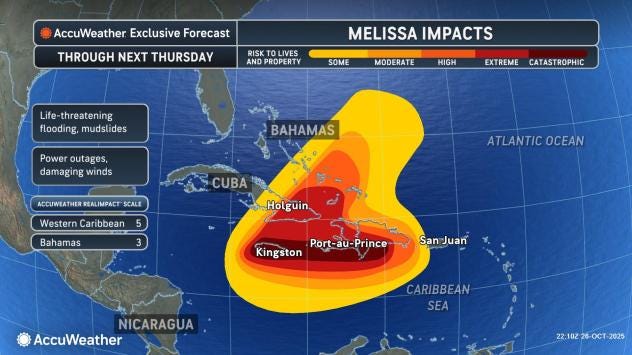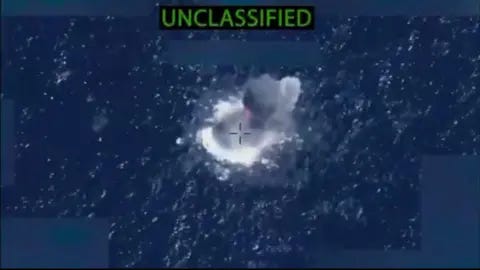10 Things Global News - 29th October 2025
Interesting and important news from around the world
Record Hurricane Melissa Devastates Jamaica, Heads for Cuba
Israeli Strikes Test Gaza Ceasefire Amid Hostage Dispute
North Korea Fires Missiles Before Trump’s Seoul Visit
US Strikes Kill 14 on Alleged Drug Boats
Deadly Rio Raid Leaves 64 Dead, 81 Arrested
Oil Slips as Sanctions Doubts Meet OPEC+ Supply Boost
Trump Says He Threatened 250% Tariffs on India, Pakistan
UN Flags Lagging Climate Pledges Before COP30
Gates Rejects ‘Doomsday’ Climate Framing
China Buys First US Soybeans of the Season
On this day ….
On this day in 1969 from a modest computer lab at UCLA, researchers sent a two-letter message—“LO”—to another terminal at Stanford, before the system crashed.
That failed transmission marked the birth of ARPANET, the U.S. defence project that evolved into today’s Internet. Within decades it transformed communication, commerce and politics worldwide, erasing borders and reshaping power.
Yet the same network that democratised information also enabled disinformation and control. The line from that brief “LO” now stretches to every connected device on earth.
Has the internet been a force for good or for ill?
Hurricane Melissa has torn through Jamaica as a Category 5 storm, bringing catastrophic winds, flooding and landslides before weakening slightly on its approach to Cuba. With sustained wind speeds of 185mph, it was the strongest hurricane to strike the island since records began in 1851. Officials reported widespread power outages, extensive damage in St Elizabeth and several deaths across the Caribbean.
Prime Minister Andrew Holness declared Jamaica a disaster area, warning that no local infrastructure could withstand such force. Around 15,000 people took shelter as floodwaters trapped families and crippled emergency services. Cuba’s president, Miguel Díaz-Canel, urged citizens to stay in shelters as the storm advanced toward Santiago de Cuba, where more than 500,000 people were evacuated.
Meteorologists said the storm’s rapid intensification reflected unusually warm ocean temperatures linked to climate change, with scientists calling it “the storm of the century” for Jamaica.
Sources: The Guardian, Associated Press
Israel launched strikes in Gaza late Tuesday after Prime Minister Benjamin Netanyahu ordered a “forceful” response to what he called a ceasefire violation by Hamas. Medics reported at least nine deaths as bombardment hit Gaza City and other areas. Earlier the military said militants fired a rocket-propelled grenade and a sniper shot at troops in southern Gaza; Hamas denied involvement and said it remained committed to the truce.
Tensions had already risen over the return of hostage remains, with Israel accusing Hamas of handing over remains already recovered in 2023, while Hamas cited obstacles to searches.
Defence Minister Israel Katz said the shooting was a “crossing of a glaring red line” to which the IDF would respond “with great force”. From Washington, Vice-President JD Vance said the “ceasefire is holding”, while President Donald Trump, speaking separately, said “nothing” would jeopardise the truce and that Israel “should hit back” if a soldier was killed.
Sources: Washington Post, Times of India
North Korea test-fired sea-to-surface strategic cruise missiles off its west coast on Tuesday, a day before US President Donald Trump’s arrival in South Korea for an Asia-Pacific forum in Gyeongju. State media said the missiles flew for more than two hours and were designed to carry nuclear warheads. It was the second launch in a week, following last Wednesday’s test of what Pyongyang called hypersonic missiles.
The timing came as Mr Trump repeated offers to meet Kim Jong-un; North Korea has not responded and says it will not reopen dialogue unless it is accepted as a nuclear weapons power.
South Korean officials signalled a Trump–Kim meeting was unlikely. Separately, Pyongyang has drawn closer to Russia, while its foreign minister met Sergey Lavrov in Moscow as both sides pledged to accelerate bilateral ties.
Sources: New York Times, Times of India
US forces killed 14 people in strikes on four alleged drug-trafficking boats in the eastern Pacific on Monday, ordered by President Donald Trump, according to Defence Secretary Pete Hegseth.
One person survived and was rescued by Mexican search-and-rescue teams, with Mexico’s navy saying it was searching roughly 400 miles from Acapulco. The Pentagon says the vessels were known to intelligence and transiting established narco-trafficking routes carrying narcotics.
The attack is the latest in a series on suspected smuggling boats in the Pacific and Caribbean, taking the death toll to at least 57. The campaign has drawn regional condemnation and legal scrutiny: members of the US Congress have questioned the president’s authority, while international law experts argue the killings lack due process. Mexico’s President Claudia Sheinbaum said her government “does not agree with these attacks” and has asked officials to meet the US ambassador, as tensions rise alongside a broader US maritime deployment.
Sources: The Independent, BBC
About 2,500 police and soldiers launched a pre-dawn raid against the Red Command in Rio de Janeiro’s Complexo do Alemão and Penha favelas, triggering hours of gunfights near the city’s international airport.
Officials said at least 64 people were killed, including four police officers, in what authorities and local media described as the deadliest operation in Rio’s history. Police reported 81 arrests and the seizure of 93 automatic rifles. Traffickers reportedly used weaponised drones to drop explosives on special forces teams.
Rio’s governor, Cláudio Castro, declared the city “at war” and said the mission was the biggest such operation since 2010. Human rights groups and the UN’s human rights office called for investigations into the deaths, as residents described sustained gunfire from shortly after 4am and ongoing operations through the day. Officials warned of possible reprisals and placed forces on high alert across the state.
Sources: The Guardian, NPR
Oil prices extended a three-day slide, with Brent down 7 cents to $64.33 a barrel and WTI down 7 cents to $60.08, as traders questioned whether US sanctions on Russia’s Lukoil and Rosneft will materially curb supply. Earlier gains from surprise US inventory draws faded despite reported falls in crude, gasoline and distillates.
Focus shifted to supply signals. Shipments of crude at sea hit a record, reinforcing concerns about a looming glut, while OPEC+ is leaning toward a modest December output boost, with two sources citing about 137,000 barrels a day.
Doubts over sanctions’ bite were underscored by mixed buying signals in Asia: some Indian refiners paused new Russian orders, but Indian Oil said it would keep purchases if compliant. Germany said Rosneft’s German assets would be exempt under current assurances. The combination of soft demand, spare capacity and cleaner positioning left prices vulnerable to renewed selling.
Sources: Reuters, Bloomberg
US President Donald Trump told business leaders at the APEC summit in Gyeongju that he threatened India and Pakistan with 250% tariffs to help push an end to their four-day conflict earlier this year. He repeated his claim to have brokered the ceasefire, a contention that has angered Indian officials. He also described Prime Minister Narendra Modi as “the nicest-looking guy” who is a “killer” and “tough as hell.”
Trump said Vice-President JD Vance and Secretary of State Marco Rubio engaged counterparts as top generals worked out a ceasefire, which he later revealed on social media before either country announced it. India has rejected US mediation claims, with officials maintaining the decision to cease hostilities was reached bilaterally.
Modi skipped a regional summit in Malaysia amid concern Trump would reprise the claim. Trump said he warned both Delhi and Islamabad that the US would halt deals while they were fighting.
Sources: Bloomberg, Times of India
Only 64 countries have submitted updated plans to cut emissions ahead of next week’s COP30 in Belém, covering about 30% of global emissions. The UN’s review says these pledges would lower emissions by around 10% by 2035 — far short of what scientists say is needed to keep warming below 1.5C. The gap underscores the task facing leaders as they convene, with some major emitters yet to file new plans.
UN climate chief Simon Stiell said the latest round shows “green shoots” and clearer stepping stones toward net zero; however, he urged faster action. Secretary-General António Guterres has warned that overshooting 1.5C is now inevitable in the near term, even if temperatures could be brought back down with accelerated cuts.
Some governments may table additional pledges during the summit, but the UN stresses that ambition must be matched by delivery.
Sources: BBC, UN News
Bill Gates has issued a memo arguing that climate change, while serious, “will not lead to humanity’s demise,” and urging a shift from alarmism toward policies that improve lives in poorer countries.
He argues the climate community is focusing too much on near-term emissions goals at the expense of effective actions on energy, agriculture and health.
The memo lands a week before COP30 in Belém. Gates says success should be measured by human welfare as well as emissions, calling to drive the clean-tech “Green Premium” to zero and to back innovations he continues to fund, including nuclear.
He will not attend the summit, but frames it as a chance to refocus strategy toward adaptation and development alongside decarbonisation.
Sources: New York Times, Gates Notes
China’s state-owned COFCO has bought three US soybean cargoes for December–January loading, amounting to about 180,000 tonnes, according to trade sources. The purchases are China’s first from this year’s US harvest and come days before Donald Trump and Xi Jinping are due to meet. Traders said the volumes are limited and do not yet signal a broad resumption of demand after heavy South American buying.
Benchmark Chicago soybean futures rose to a 15-month high this week, rebounding from recent five-year lows on hopes for progress in US–China trade.
Bloomberg separately reports at least two US cargoes booked and says officials reached a framework over the weekend to pave the way for leaders to finalise a deal that could roll back tariffs and restrictions. Even so, market participants remain cautious about how much the purchases will expand this season.















